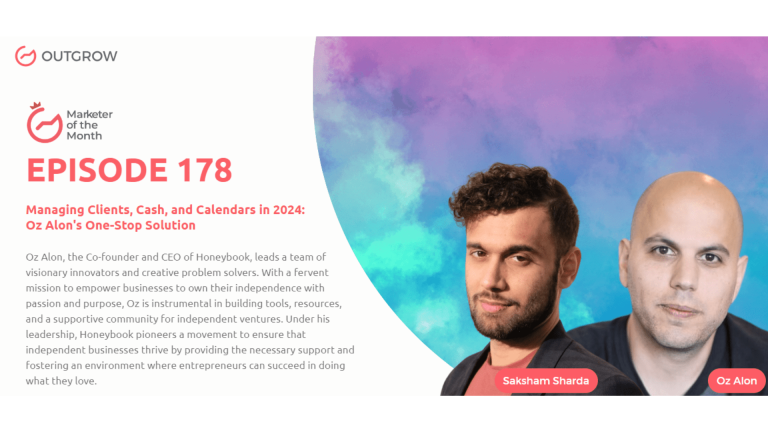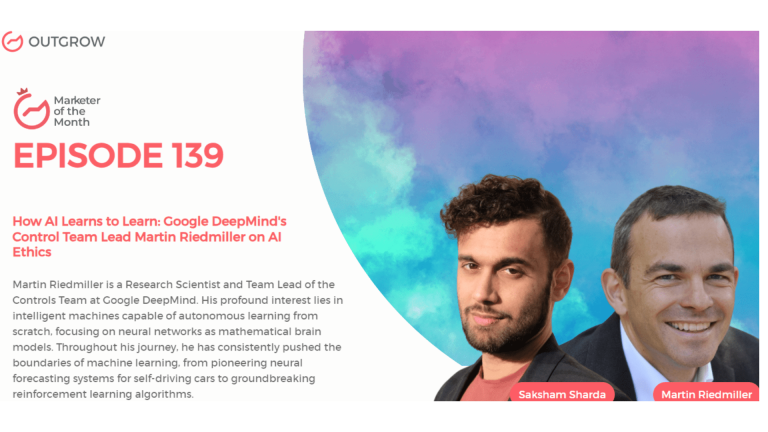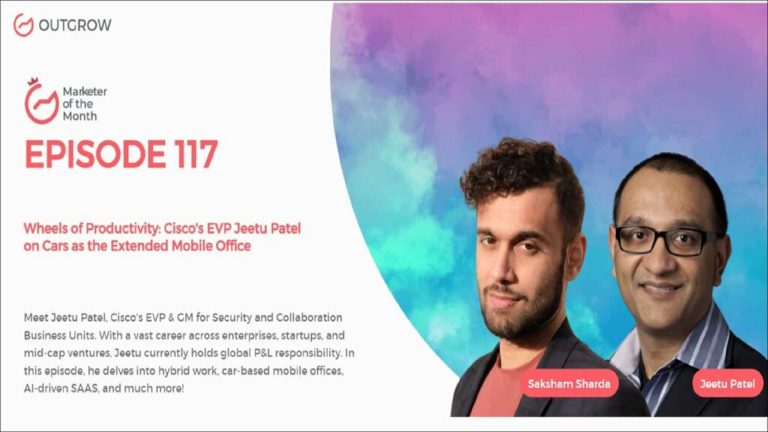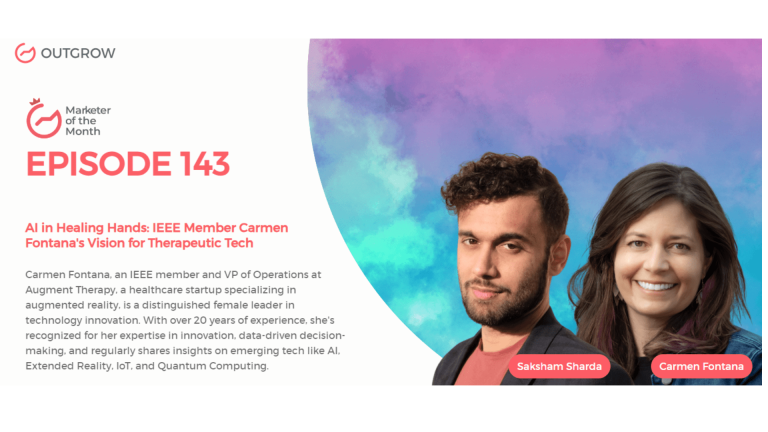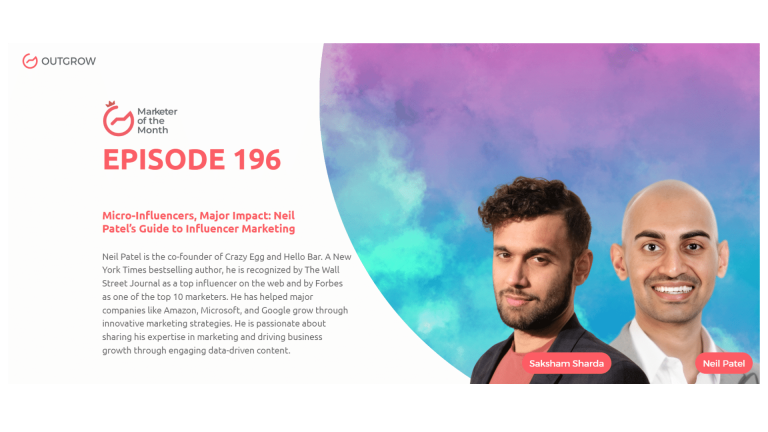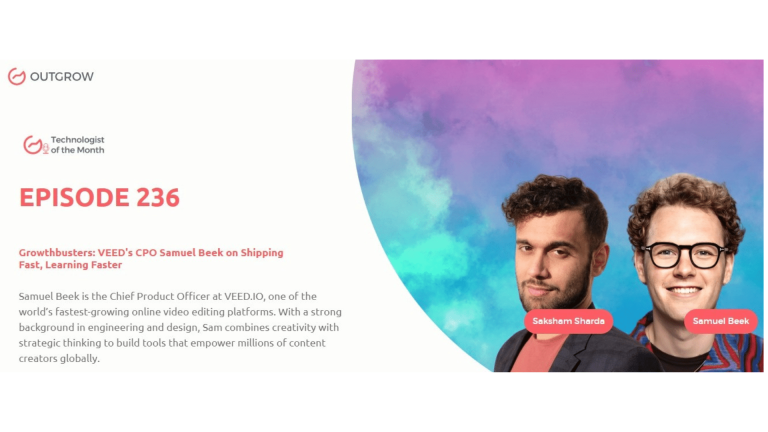EPISODE 156: Marketer of the Month Podcast with Mafalda Alves Dias
Table of Contents
Hey there! Welcome to the Marketer Of The Month blog!
We recently interviewed Mafalda Alves Dias for our monthly podcast – ‘Marketer of the Month’! We had some amazing insightful conversations with Mafalda and here’s what we discussed about-
1. Unveiling Vodafone Portugal’s public sector role
2. Analyzing strategy discrepancy: Vodafone’s public and private sector approaches
3. Harnessing data insights: Vodafone’s impactful analytics initiatives
4. Data privacy and cybersecurity at Vodafone: Mafalda Alves Dias’ insights
5. Bridging the digital divide: Vodafone’s vision for sustainable initiatives
6. Vision amidst Vodafone’s telecom innovation
About our host:
Dr. Saksham Sharda is the Chief Information Officer at Outgrow.co. He specializes in data collection, analysis, filtering, and transfer by means of widgets and applets. Interactive, cultural, and trending widgets designed by him have been featured on TrendHunter, Alibaba, ProductHunt, New York Marketing Association, FactoryBerlin, Digimarcon Silicon Valley, and at The European Affiliate Summit.
About our guest:
Mafalda Alves Dias leads Vodafone Portugal’s Large Business & Public Sector, advocating dignity and innovation. With over seven years at Vodafone, she shapes strategies and drives tech-driven solutions, focusing on cyber security, startup mentorship, and healthcare technology. Her leadership emphasizes respect and innovation in equal measure.
Guardians of the Grid: Vodafone’s Head of Large Business Mafalda Dias on Melding Privacy with Progress
The Intro!
Saksham Sharda: Hi, everyone. Welcome to another episode of Outgrow’s Marketer of the Month. I’m your host, Dr. Saksham Sharda, and I’m the creative director at Outgrow. co. And for this month we are going to interview Mafalda Alves Dias, who is the head of Large Business & Public Sector at Vodafone.
Mafalda Alves Dias: Great to be here. Thank you.
Don’t have time to read? No problem, just watch the Podcast!
<
Or you can just listen to it on Spotify!
The Rapid Fire Round!
Saksham Sharda: Sounds good. Let’s go. Alright, so let’s start with the rapid-fire round. The first question is, at what age do you want to retire?
Mafalda Alves Dias: Now.
Saksham Sharda: How long does it take you to get ready in the mornings?
Mafalda Alves Dias: Half an hour.
Saksham Sharda: Most embarrassing moment of your life.
Mafalda Alves Dias: Oh my God. Pass
Saksham Sharda: Favorite color?
Mafalda Alves Dias: Red, of course.
Saksham Sharda: What time of day are you most inspired?
Mafalda Alves Dias: At night, Late night.
Saksham Sharda: How many hours of sleep can you survive on?
Mafalda Alves Dias: Well, it depends on the number of days. So if it is one day, I can survive without any sleep. If it is for one week, I need to have at least four hours.
Saksham Sharda: Fill in the blank. An upcoming technology trend is ______.
Mafalda Alves Dias: Data Monetization.
Saksham Sharda: The city in which the best kiss of your life happened.
Mafalda Alves Dias: Lisbon, for sure.
Saksham Sharda: Pick one- Mark Zuckerberg or Elon Musk?
Mafalda Alves Dias: Elon Musk.
Saksham Sharda: The biggest mistake of your career?
Mafalda Alves Dias: Going into technology.
Saksham Sharda: How do you relax?
Mafalda Alves Dias: I do Yoga.
Saksham Sharda: How many cups of coffee do you drink per day?
Mafalda Alves Dias: Well, it depends on the day, but I would say four or five.
Saksham Sharda: A habit of yours that you hate?
Mafalda Alves Dias: I pass.
Saksham Sharda: The most valuable skill you’ve learned in life.
Mafalda Alves Dias: Love.
Saksham Sharda: Your favorite Netflix show.
Mafalda Alves Dias: Well, the Crown, I would say.
Saksham Sharda: One-word description of your leadership style.
Mafalda Alves Dias: Motherhood.
Saksham Sharda: A top priority in your daily schedule.
Mafalda Alves Dias: My kids. I would say.
Saksham Sharda: Ideal vacation spot.
Mafalda Alves Dias: Oh, that’s easy. It’s an island with no wifi connection.
Saksham Sharda: A key factor for maintaining a work-life balance.
Mafalda Alves Dias: Get along with your priorities.
Saksham Sharda: Memorable career milestone.
Mafalda Alves Dias: Surviving till today.
Saksham Sharda: The last song you’ve been listening to.
Mafalda Alves Dias: Pass. I don’t remember.
Saksham Sharda: The last film that you saw that had a good impression on you.
Mafalda Alves Dias: The last film I saw was the Mafia of Spain. I don’t know if that’s the English name, but that was the one in particular in the States.
The Big Questions!
Saksham Sharda: Was nice. So that’s the end of the rapid fire. Okay, let’s go to the longer questions now with Michael.
Michael Olsen: Right. We’re very glad today to welcome Mafalda Alves Dias Head of Large Business in the public sector for Vodafone Portugal. And quite often with these podcasts, we like to ask the person about their background, what it was, and their background that then led them to the job they have now. But I think here, here for once we have an industry veteran where that’s not even relevant. They’ve been in the telecom industry for quite a while. I understand. But again, the latest post is Head of Large Business and the Public Sector. What does that entail? What are your duties there for Vodafone Portugal?
Mafalda Alves Dias: Hi, Michael. So, you are right. I’ve been working in telecommunications since 1996. So a long career on that. And this, my last position as head of a large corporation and public sector is a segment area. So I have the marketing and commercial area for those two segments. So both for the large corporations in Portugal and the public sector, the entire public sector. So I coordinated an area of around 80 people. Most of the majority of them are commercial teams. Okay. So a sales representative.
Michael Olsen: Okay. But it’s interesting though, they put together a large business and public sector that is private and public. But is there enough commonality, or is it not all that too much different to be able to be handled in that way?
Mafalda Alves Dias: Well, it depends on what you’re talking about. See, if you’re talking about the traditional telecommunications, so connectivity, it’s very similar when you’re going to the new, the new lines like IOT and you know, even big data or analytics, that’s completely different, the approach that we have in those two segments. So it depends on the portfolio that you’re addressing.
Michael Olsen: Okay. So you just said with the more advanced technology, you have to take a different approach for the two sectors. Can you give us some insight? What is the difference in how you have to approach, you know, public versus private trying to push the latest technology?
Mafalda Alves Dias: Okay, let me give you a very quick example. So when you are talking about IoT, for instance when you’re in the public sector, we are very focused on the city’s water management, smart lighting, you know, these kinds of solutions that of course bring the sustainability topic to the table. And that will increase, you know the population’s quality of life. I, for instance, do not know if you are aware that in Portugal, we are losing one Olympic pool of clean water every minute. So these kinds of solutions are important for society, the cities, and the communities. When you’re talking about corporations these kinds of solutions are more focused on efficiency, right? So it’s like an industrial company wants to gather information about the machining process, the production processes, understand what they are doing right, and what they can do better and improve that Information, we use that information to improve the process and efficiency. So that’s, so two different approaches and the same product, but that’s how the segments work. Okay. And interesting the efficiency with the public companies or with the private, with the private large companies. And that’s not, that’s undoubtedly very viable, although it seems maybe not so exciting to write home about at least compared to what I’ve heard of some of the data analytics that you’ve done in a public sense doing some very interesting analytics for various public for cities and other public authorities. At major rock concerts, and major events. Could you give us some examples of that? There was World Youth Day, for example, this last year. Yes. So on, on the public segment, we did the last one, the last big one that we did was exactly the World Youth Day. That happened in Lisbon. Now in August, back in August, we had 1.5 million visitors in Lisbon, which is a city where in the city center around half a million people live. So we multiplied by four the number of people in the city during that week. Basically what we did was we analyzed people’s flows within that week, and we learned a lot of interesting things, like people even living in Lisbon left the city, 10% left the city before the event began, and they only came back when they attended. So they escaped from, all, the First that was going around. We also learned that the Spanish and the Italians were the first ones to arrive. They wanted to get to the party early, and we saw the flow of the people, the movements they were doing during that week from event to event where they were staying, where they were sleeping, and so on. And we were, with that information, we were able to not only provide a, better service, for our shops, for instance, or even our network resilience, but also, we fed that information into Lisbon City Hall so they could use it regarding the logistic processes and security, public transportation movements and so on. So it was the, the last, the latest big one that we did. But we do a lot of analyses, of the government or the public sector. One that I like a lot is a project that we have done with the fire department in the Algar. So wildfires are something that unfortunately happens in Portugal every year. What we did was the fire department defined the fire area, and we were able to provide them the information or feed them the information on how many people were in there and out of that area. So they will take a decision immediately on reinforcing the firefighters in that area or not. So this is an example of how we can use the information and the data and turn the data into information and we can act upon it because it’s almost real-time. And that’s a big difference. So we do believe that this area, this stream is going to be of a major necessity from now on. So let’s see. That you’re saying even you’ve, you’ve made it a major necessity, necessity perhaps now, now that Lisbon knows that’s possible that they can now not imagine doing without for future such events possibly.
Michael Olsen: Okay. Well again, you were talking about that data analysis for, for the companies and then for the wildfires and then the raw contents of the World Youth Day. And in particular, for the latter, we’re talking about human data there, where a person’s activities. And so that, that, you know, that raises the issue of just what you do with it, what you do to, for, to establish privacy. Now, of course, under the EU you have the GDPR mandating various privacy elements. How do you handle that issue to reassure people? That their privacy is retained?
Mafalda Alves Dias: Privacy for us is mandatory. Okay. So we don’t play around with that. We, when we treat all the data that we gather from our base stations we do a work to anonymize and aggregate it. And, we do it in such a way that is impossible to return and to go back to individual data, to give you an easy example, to comprehend. If we have like five registrations in one BTS, we are going to erase that information because it’s too close to the individual so you can trace it back to the person. So what we do is we have minimum amounts of thresholds where below that we don’t analyze the data. We do, of course, the statistical speculation of that, but we don’t look at it. So we are very keen on being compliant with all the GDPR regulations, of course, so that we don’t joke about service on that. And we even got an honorable mention for the work that we are doing here from the association for data privacy. So that’s something we are very proud of because of course, we understand the potential of the use of this information, but we respect the individuality and the privacy of the people. So basically that’s how we do it, Michael.
Michael Olsen: Well, that sounds good. And I’m wondering, though, at the industry level, within the Portugal telecom industry, if you have other competitors. What’s your industry-wide assessment about the treatment of privacy? Or you’re ahead with the curve, or, hopefully at least your competitors have some minimal amount of respect as well for that.
Mafalda Alves Dias: Well, I’d like to hope so, and I’d like to think so. I cannot vouch for their work, of course, but from Vodafone, Portugal is inside our culture, and we do respect it a lot, both internally, and with our partners that work with us. We, that’s something that we take very seriously, not only in the product by design, you know, we use that in the product design. We use that in training for the team. So it’s something that we are always taking care of because, of course, it is a hot topic in the industry. Not only, and we, we would like to be known as the most respectful ones, in that area.
Michael Olsen: Sure. Well, you know, a related subject with the sort of, especially data traffic you provide, is cybersecurity keeping people from getting viruses getting hacked and that sort of thing. That’s something you, that you, you’ll have to do as well. Customers will demand it. What is VO from Portugal’s commitment and actual active measures to provide a healthy level of cybersecurity to its customers?
Mafalda Alves Dias: So, Michael, I don’t know if you are aware, but Vodafone, Portugal itself was a victim of a massive cyber attack last year. So we know firsthand what is going through that experience. So not only on that but of course we have the industry trend and we have, all the spectrum of the cybersecurity portfolio for our customers. Okay. So we start with the identification of the risks. We have all the products to protect your business. And we also have, after the protection, if there’s an intrusion, we have also detection and then the response. Okay. So we have, we go end to end on that. Some of the services are in-house, and some of the services are through partnerships. But basically, we like to provide in that area an end-to-end offering to our customers. Let me give you a quick example. So one of the things that we just worked on last year or this year was the anti-phishing service which is a service that identifies the SMISHING through SMS. Okay. So that is a trend that is growing a lot in Portugal. So you get an SMS with a link, and if you click data, try to capture your data. So that’s something that is happening a lot in Portugal and is growing a lot. We developed an in-house service that blocks that access so we can protect the final consumers basically, but also our businesses that are our customers because usually, those SMSs are going on behalf of our retailer that is well known or something like that. So this is the kind we have to, you know, you, we have to be always on top because cybersecurity is, I would say, the fastest growing industry in the world. I thought about a study the other day that said if cybercrime was a country, it’d be in the top five countries, the richest countries of the world. So cyber cybersecurity is one of the areas that is, of course, one of the pillars of our portfolio. But we’ll keep on working on it because it’s continuing to grow and we have to be there for it. And actually, we do think that tools like artificial intelligence and AI generation will be helpful. It’ll be, of course also a threat because this will be used by cybercrime, but it’s also an opportunity to use it in defense. So it’s an area of the Future.
Michael Olsen: Well, you know, one particular reason is to take cyber security very seriously, apart from everything else, of course, are recent trends which we’re all familiar with, considering remote work, you know, kicked off by the COVID epidemic, everyone for health reasons needed to work outside the office much more. And you’re, you’re aware that in many cases, that stuck even as the disease threat has gone away, more people are working remotely, and that post is various new telecom challenges. Wanted to ask you about how full Portugal has what changes you’ve seen and how you’ve dealt with accommodating your customers with this new phase of services you need to provide.
Mafalda Alves Dias: Okay. So let me start with an example. When COVID-19 struck in three days, we had to put our entire call center from the offices into the people’s houses. Okay. And this is more than 1000 people. So these demands are highly connectivity that works basically. So I would say connectivity and 5G will play a major importance in that. So you don’t have an office anymore? We do have offices, but the office now is extended, you know, to the people’s houses as you’re saying. And we do believe that the 5G will bring the, I would say the removal of geographical barriers. I think that’s the main, the main point that, that the main game changer that 5G is bringing. And this answers completely to your question, right? So if you have a connectivity that reaches everywhere that you can work as if you were in the office, as if you add fiber connection, then basically you are in the same space and you can do the same things that you were in your office. So I do think that COVID, brought that to light, but technology already had the answer.
Michael Olsen: Okay, because at least for your initial example, of course, that was internal, that was how you internally had to make changes to do it. But surely also externally in terms of the services you can provide to other customers gives them similar capabilities, do the same thing, or any variation that they like.
Mafalda Alves Dias: Exactly. So basically when to, for you to know Michael, when Covid stroke I was working 20 hours a day because our customers were doing that same exercise, right? So they were moving from their offices and spreading everyone on there, in their own homes. And being, they had to have connectivity, they had to have VPN access, they had to have firewalls in place. So that was a lot of work, but I think today is the new normal.
Michael Olsen: Right. Okay. Moving on to what we could call more sort of ESG-type topics. There’s a special one I wanted to mention to you in, in the Portuguese context, possibly you know, the bridging of the digital divide. Digital divide, of course, where there’s this societal chasm between those on one side, on one side who have full access to and capability in the latest technologies, and those on the other who are left behind and don’t have access to it. What, if anything, is Vodafone Portugal doing within Portugal to ease the digital divide and, and bring people, you know, into the modern world so they too can take advantage of it for employment and all that sort of stuff?
Mafalda Alves Dias: Okay. So first of all, I would say all investments that we are doing in our network to cover the country have and have no gray areas on connectivity as we are just saying. That’s the number one, I would say, because you have to have, give access for people to the, you know, to the digital world. So that will be the number one. And I’ll say the basic one again. I do think that 5G will be a game changer in this area because it’ll bring connectivity, connectivity at a high-level speed where you once didn’t, didn’t have, you know, fiber connection or fixed connection. So that will cover some gaps that the technology and the networks didn’t have. And I think that will be outside the number one thing that we are doing. But also we do have to act as a purpose with a purpose. Okay? So what we do is we do have programs to help inclusion and digital inclusion. For instance, to kick off, I would say one that I like is our Vodafone Power lab. Power Lab is a project that we have that supports startups in the technology world to bring and bring them to the market. Okay. So we act as mentors and coaches and so on, and we give them the opportunities on that. So I think that’s a way of providing that access to, to, in this case, usually, young kids that want, have good ideas, and we, we help them to bring them into the market. But we also have other kinds of programs through the Vodafone Foundation. I, myself, was a volunteer in the Code, like a Girl program. So we were teaching, you know, girls from the high school to code that is usually something connected with, you know, more male things. So that was fun work that we did. So we have I would say a different, varied wide spectrum of exercises in that topic.
Michael Olsen: Now, real quick, from what you mentioned, I get the impression that 5G tech has not yet arrived at least to work from Portugal or to Portugal at all.
Mafalda Alves Dias: It’s not yet arrived. Yes.
Michael Olsen: 5G is in Portugal. Sorry. As I thought now, although, I have here that coming up soon in the future is a so-called 5.5 G Advanced.
Mafalda Alves Dias: That will be five five. What you’re probably mentioning is the standalone networks. Is that it? I don’t know.
Michael Olsen: I just, I was researching 5G and heard, coming up 5.5 G, also known as advanced 5G of course. So, no, but I’d like to still stay on ESG-type subjects and go to the course you know, sustainability and climate change because you know, you’d think that telecom will be fairly clean in terms of what it does. But, we had an interview yesterday with a Polish telecom, you know, it depends on where they get their energy from. If it’s from fossil fuels, that’s not so good. You know, what are Vodafone’s postures and moves in the climate change that sustainability is?
Mafalda Alves Dias: Don’t know if you are aware, but the planet is one of our three pillars in the strategy. Okay so we, yes, we take it very seriously. So we have three pillars, by the way, it’s inclusion for all planets and digital society. Okay, So that’s what we act upon on the planet that you’re just mentioning. So on the 1st of July, 2021, the European network for Vodafone was all based on renewable energy. Okay. And that is a milestone. It’s a hundred percent, So that’s a milestone that we reached in 2021, and now we have the objective of putting all the networks. So this was in Europe, we are putting all networks worldwide by 2030, also 100% on renewing the renewal energy. We also commit by 2030 again to have all operations zero neutral carbon. Okay. So that’s a milestone that we are working on. And that is from the internal perspective that I think that was, your question. But we also again, provide a lot of products to our customers so they can do that path. Okay. So things like smart energy solutions and analytics on the, their spend and so on. We are working on that too, to help the customers, too, to reach those, kinds of milestones in their businesses.
Michael Olsen: And again, this is, this is in Portugal. This is what your company is doing. To aid again, even keeping a step ahead of the global ambitions or objectives of Vodafone International, which is exactly what is based in England, I suppose in the UK or the Vodafone. But okay. No, very, very impressive. You know, we were talking about 5G and advanced 5G, and there’s and there’s the internet of things, and of course, there’s artificial intelligence. Wanted, to see if we can have you take a look forward, at where you think technology is going and how Vodafone will, will come along for the ride, and take advantage of that to optimize its services even further.
Mafalda Alves Dias: Yeah. So I called again. We are in an area where 5G is bringing speed to things that humans cannot cope with. One example I always share is the fastest movement or human movement in the blink of an eye. And 5G is 10 times faster than that. Okay, So we cannot match the velocity. And what we are doing today is, and this seems that I’m going off-topic, but I’m not, what we are doing today is we have a lot of data spread around, and we capture that data and transformative it into, into information when what we do with that information is we give it to the humans and humans take the decisions upon it, right? So the speed that 5G is going to bring to everything is not going to be, you know it’s not going to be followed by, by the human velocity. So you’re going to need to have artificial intelligence on top of it to replace humans’ decisions because they’re going to be much faster. So once you’re thinking about it, the decision is already taken, and that’s the way we see things evolving. Okay, So that’s the way we think the processes are going to move ahead and how digitalization is going to enter the companies and even to the, you know, the government entities will, will also have that the same path. So of course, this is a bit frightening for us because we want to know to see ourselves as, you know, we are the, the most, the, the fastest and the smartest and everything. And that’s not true at this point.
Michael Olsen: Especially with artificial intelligence, you mentioned smishing before. One can imagine, you know, that could supercharge it so it gets even easier to fool people and to take advantage of them.
Mafalda Alves Dias: But you, you have to wear them, to use the same weapons in reverse, right? So of course in the India attacks, and going back to that point, cyber attacks will use artificial intelligence. You have to use it to defend it, you have to be quicker. So there’s no way around it.
Michael Olsen: And, you mentioned government influence. What is your assessment? Is the government helpful or, overregulating or supporting financially or in other ways, your adoption of advanced technology?
Mafalda Alves Dias: I have to pass that one. Okay.
Michael Olsen: Understand. Alright. Well, you mentioned the past partnerships. So what is your approach to partnerships? Especially perhaps in the same topic of advanced technology or, otherwise, you know, working with other co-companies in a way that you both gained. Any examples of that?
Mafalda Alves Dias: Yeah, sure. Even last week, I don’t know if you saw it, our CEO Margarita de la Valle announced a partnership that we did with Accenture on managed services. So we have partnerships throughout the company on a strategic level, but also an operational level. So we are very much focused on our customers and we like to deliver, you know, end-to-end solutions to their problems. So that sometimes means going out to a partnership and getting along with the partner to answer to the customer’s needs. We don’t have everything in-house. It’s impossible to have all the innovation in the technology market in-house. So we like to do it well. It doesn’t mean we need to do it in-house. So we do use partnerships very often.
Michael Olsen: Okay. It sounds like there is a set amount of experience and even a protocol within your company for approaching and engaging in partnerships, in a mutually beneficial way with other companies that you can work well with.
Mafalda Alves Dias: Yes, definitely.
Michael Olsen: Okay.
Saksham Sharda: We’re good. Alright. So the last question for you is of a personal kind, what would you be doing in your life, if not this right now?
Mafalda Alves Dias: I’ll be retiring on the beach, but drinking margaritas.
Let’s Conclude!
Saksham Sharda: Thanks, everyone for joining us for this month’s episode of Outgrow’s Marketer of the Month. That was Mafalda Alves Dias, who is the head of the Large Business & Public Sector at Vodafone.
Mafalda Alves Dias: Pleasure. Thanks for having me.
Saksham Sharda: Check out the website for more details and we’ll see you once again next month with another marketer of the month.

Muskan is a Marketing Analyst at Outgrow. She is working on multiple areas of marketing. On her days off though, she loves exploring new cafes, drinking coffee, and catching up with friends.




